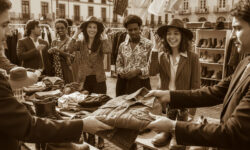
What Is Translocal Living?
Globalization is no longer just trade routes and shipping containers. It is also a quiet change in how people live. Many of us now build everyday routines that span more than one city. Some stay three months in one place and six in another. Others split the year between two homes. Some keep a job in one time zone while caring for family in another. This is translocal living: a life that is rooted in multiple places at once.
Translocal living is different from constant travel. It is not about chasing novelty. It is about stability you can carry with you. The goal is simple. Keep your days calm, even when your maps change.
Why It’s Growing Now
Several trends push people toward translocal life:
- Flexible work. Many roles now support remote or hybrid schedules.
- Digital services. Health, banking, learning, and even fitness now run online.
- Family ties. Couples and extended families often live in different countries.
- Cost balancing. People pair a higher‑pay city with a lower‑cost base.
- Curiosity and comfort. A growing set of tools makes moving less of a hassle.
But tools alone do not make a life. You still need habits. You need a schedule you can defend. You need friendships that outlast flight changes. This article is a practical field note on how to do that.
Your Personal Infrastructure
Connectivity that never surprises you
A working phone and steady internet are the backbone of translocal life. Set them up so service never depends on a single provider or a single SIM. If your phone supports eSIM, use it. One plan can be your “home line.” The other can be local data wherever you land. Switch without touching a tiny tray or hunting for a shop.
Keep a small kit in your bag: a travel router or hotspot, a short ethernet cable, and a compact power strip with a surge protector. These items solve most network and outlet problems in rentals and hotels. Ask hosts about upload speeds, not just download. Video calls depend on upload. If the answer is vague, plan for backup. A coworking day pass can save an important meeting.
Addresses without a fixed address
Postal systems assume one home. Translocal living does not. The fix is to split your “address” into types:
- Legal address: The place you use for official mail. This can be a permanent family home or a long‑term mailbox service that scans envelopes for you.
- Logistics address: A pickup locker, coworking space, or a friendly café that accepts packages with permission. This is for deliveries while you are in town.
- Community address: A library card, a gym membership, and a local volunteer group. These create social anchors and make you feel at home.
Keep these separate. Your passport renewal should not depend on the same address as your online orders.
Money across borders that remains simple
Multiple currencies and fees can become a tangle. Keep a simple rule: choose a base currency for your budgeting and convert everything back to it. Track your monthly non‑negotiables—rent, insurance, savings—in that base currency. For daily spending, use a card known for low foreign transaction fees and keep a small reserve of local cash for markets and taxis.
One more rule helps: separate spending from savings. You will avoid the common mistake of drifting into savings to cover routine costs. If you do move money across accounts, write a quick note for yourself about why. Tiny habits like this protect you from the “oops, where did the month go” problem, even when exchange rates shift.
Routines You Can Carry
The three‑block day
When time zones change, calendars can look chaotic. A simple structure helps. Try a three‑block day:
- Deep Work Block: 2–4 hours, phone silent. Do your hardest tasks here.
- Coordination Block: Calls, messages, and emails. Stack them.
- Life Block: Movement, errands, food prep, and rest.
Place these blocks based on your team’s core hours and your local daylight. If your colleagues are far away, run deep work in your morning and coordination in the late afternoon. If you rotate cities often, keep the block pattern fixed. Your brain will find steady ground even as clocks move.
Eat like a local, cook like yourself
Eating well is the difference between feeling settled and feeling adrift. Commit to a simple base menu that you can cook anywhere. Then fold in local ingredients for flavor. Carry a small “pantry roll” in your bag: salt, pepper, a favorite spice blend, tea or coffee, and a compact knife guard for a sharp chef’s knife if you bring one. Many kitchens are stocked but blunt.
Use markets to learn the city. Go early, ask questions, and buy whatever is fresh and friendly. Markets are also where you practice short, cheerful phrases: greetings, thanks, and “what do you recommend?” This builds real connections faster than any app.
Movement you can do on tile floors
Hotel gyms vary. Parks are not always nearby. Your workout should not depend on luck. Choose two routines you can do on any floor: a bodyweight circuit and a mobility sequence. Add a resistance band to your bag, and you have a full plan. If you crave community, buy day passes to local pools or climbing gyms. They are often social hubs, and they welcome drop‑ins.
Sleep that adapts
Sleep drives mood, focus, and immune health. When you cross time zones, set one priority: move your light exposure quickly. Morning light anchors your new schedule. Avoid screens late at night. If you arrive late, a short walk the next morning does more than coffee ever will. Build a tiny sleep kit: an eye mask, earplugs, and a small white noise app playlist. It is boring. It works.
Community Without Staying Put
Stable friendships in shifting places
Friendships can thrive across cities if you give them a rhythm. Use recurring slots. A 30‑minute call every other week beats sporadic long talks. Keep a shared list of topics in a notes app: books, plans, silly stories. It makes conversation easy even when one of you is tired.
In each city, pick two “third places” where you plan to be seen—one for work, one for leisure. A neighborhood café and a community workshop or library are perfect. Show up at the same hours. Learn the staff’s names. These routines signal that you are more than a tourist.
Give before you ask
To join a community, bring something first. Offer to help with a local cleanup, a meetup setup, or a school reading hour. Volunteer work is universal social glue. It also teaches you unwritten rules—how people queue, how they greet, what counts as polite and what does not.
Language on a human scale
You do not need fluency to show care. Learn a small, sturdy set of phrases: greetings, numbers, food words, directions, and apologies. Practice tone, not just vocabulary. Sound matters. People forgive grammar when your tone is warm and your effort is visible. Keep a tiny phrase notebook on your phone with a few lines you genuinely use. Update it as you go.
Health, Safety, and Calm
Telehealth, local clinics, and a list in your wallet
Health needs follow you. Create a folder with scans of prescriptions, eyeglass info, and allergies. Keep a printed summary card in your wallet with an emergency contact and any critical conditions. For routine care, telehealth can handle a lot. But you still need a local clinic for injuries, tests, or vaccines. Ask your host, coworking manager, or neighbors for a trusted list. Keep clinic hours and the nearest 24/7 pharmacy bookmarked.
Jet lag without drama
Before long flights, adjust your bedtime by 30–60 minutes for a few days. On arrival, anchor your schedule with morning light and a clear first meal time. Avoid heavy naps. If you must nap, set a 25‑minute timer. Caffeine is your ally, not your crutch—use it early in the day only.
Documents and backups
Make three layers of document safety: digital, physical, and a friend. Digital copies live in encrypted storage. Physical copies ride in a different bag than your passport. A trusted friend at “home” holds scans and can forward items for you. These layers turn a lost wallet from a crisis into an errand.
Work, Boundaries, and Time Zones
Clear rules for your team
Work spreads across clocks. Agreements keep it sane. Write down team expectations: core hours, response times, and what counts as an urgent ping. Use status messages. “On a plane. Back at X time.” is clear. Silence is not. Share calendars with time zones attached. Many tools support this, but people use them poorly. Set them up once, then review monthly.
Async that feels human
Asynchronous work is not just “drop a message and hope.” It needs structure. Use short updates that start with context, then the question or decision, then the deadline. Example: “Update on Project A: scope unchanged; need sign‑off on supplier; deadline Friday end of day GMT.” This format saves everyone from scrolling through long chats.
Meetings with purpose
Meetings across time zones must be kind and precise. Send agendas. End with a written list of decisions and owners. Rotate the “inconvenient hour” when possible. If you always ask the same person to stay late, you erode trust. People remember how you schedule as much as what you say.
Housing, Transport, and Stuff
Pick places you can understand fast
Not all cities are easy to read. As you build your rotation, pick places where you learn the basics quickly: how to get from airport to town, how to use transit cards, where to shop for staples, and how to get help if something breaks. The first week sets the tone. Cities that offer clear signage, reliable transit, and helpful locals make this lifestyle lighter.
Light luggage, smarter storage
The less you carry, the more you notice. Keep your bag simple: clothes for 7–10 days, a small repair kit, and specialty items you truly use. If you return to the same cities, consider a small storage bin with off‑season gear. It is cheaper than dragging winter boots to a tropical island or vice versa. Label bins clearly and keep an inventory note on your phone.
Transport chains you can trust
Build a default chain: plane or train to city, transit or shuttle to neighborhood, then walk or bike. Avoid edge cases like late‑night rides with no backup. If you arrive late, book your first night near your arrival station. In the morning, move to your longer stay. This cuts stress and mistakes.
Kids, Partners, and Shared Routines
Schooling options that travel
For families, a translocal plan anchors to education. Options include local schools for longer stays, accredited online programs, or a mix. Libraries often provide study rooms, events, and local reading lists. Join early. And protect playtime. New places can overwhelm. Quiet hours with familiar toys and books reset the day.
Relationships across cities
Distance changes how you show care. Set shared rituals: a weekend brunch call, a monthly postcard, a streaming watch party. People feel loved in different ways—attention, gifts, help, or simple check‑ins. Ask what matters to the people you care about. Then do that, on a schedule you can keep.
Food, Water, and Staying Well
Grocery patterns you can repeat
Find your “first five” in every city: a supermarket, a market stall, a bakery, a pharmacy, and a café you enjoy. This covers 80% of your needs. Store hours can vary, so note closing days. Keep a shopping list template: eggs, greens, protein, fruit, breakfast items, spices, cleaning basics. You will spend less and waste less.
Kitchen safety and comfort
When cooking in new kitchens, check smoke alarms, fire extinguishers, and stove type. Gas and induction require different pans and habits. Keep cutting boards stable with a damp towel underneath. Label leftovers with date and contents. Simple steps avoid food waste and midnight smoke alarm surprises.
Security and Privacy While Moving
Your devices, your data
Travel adds risk to your digital life. Reduce it with a few habits:
- Update devices before you go. Patches matter.
- Use strong screen locks and enable device‑finding tools.
- Avoid public Wi‑Fi for sensitive work without a trusted VPN or personal hotspot.
- Separate work and personal logins to limit the blast radius if something breaks.
For physical safety, trust your map sense. If you feel lost, step into a shop or hotel lobby to re‑orient. Keep one card in a different place from your wallet. A spare transit card tucked in your bag can save a day.
Sustainability Without Preaching
Small choices that add up
Longer stays mean fewer flights. Favor trains or buses for regional hops when practical. Pack lighter; weight matters for fuel. Choose efficient apartments with good insulation and natural light. Support local repair shops instead of replacing items. Buy a reusable water bottle with a filter if local tap water is safe but tastes odd. These are small, gentle choices that still help.
Testing the Lifestyle
A one‑week experiment at home
Before you commit to months abroad, run a quick test:
- Pick a new schedule. Shift your work by two hours for a week. Note what breaks.
- Cook from a small kit. Use only your portable pantry and one pan.
- Practice your “first five.” Find new grocery, café, and pharmacy options in a nearby neighborhood.
- Run on mobile data for a day to test your usage and coverage.
- Do three calls at odd hours and track your energy.
This experiment reveals friction points. Fix them before you add airports.
Case Notes: How People Make It Work
The split‑city teacher
Maya teaches language online and spends winter near her parents and summer in a coastal town. She keeps a small storage bin in each place: school props, a good microphone, and a spare laptop charger. Her deep work block runs 7–10 a.m. local time. She volunteers one afternoon a week at a library in each city. It gives her community and a steady room for lessons when her home internet wobbles.
The dual‑home couple
Jon and Petra share two apartments in different countries because of family care. They run a shared “handover” checklist on their phones. It tracks plant watering, fridge status, power settings, and bills. Each time they switch homes, the list prevents mistakes like arriving to a stale pantry or a powered‑off router. They also rotate holidays fairly: one year here, one year there, and one year away somewhere new.
The project consultant
Rina manages client projects across three time zones. She sets strict rules: no calls before 8 a.m. or after 7 p.m. local time, with exceptions booked a week ahead. Her updates follow a tight template, and she uses a short weekly newsletter for clients. Because she arrives often in new cities, she keeps a gym day‑pass budget and joins a run club on week one. Work stress drops when her feet hit the pavement.
Common Pitfalls and Simple Fixes
- Overbooking travel. Fix: plan longer stays and leave buffer days between moves.
- Ignoring sleep. Fix: prioritize morning light and a fixed wind‑down routine.
- Letting work spread everywhere. Fix: set one deep work block and protect it.
- Too much luggage. Fix: a 7–10 day wardrobe and seasonal bins in repeat cities.
- Loneliness. Fix: two third places and one recurring friendship call.
- Money blur. Fix: track in one base currency; separate spending and savings.
- Document chaos. Fix: three layers—digital, physical, and a friend who can forward.
Designing Your Multi‑City Year
Choose your loop
Pick 2–3 cities that meet your needs across seasons. Consider weather, visa rules, cost, flight or rail links, and language. Map key dates like family events or work conferences. Build your loop around them. Then add buffer weeks where you can rest and avoid peak travel costs.
Book the anchors first
Secure the items that are hard to replace: long‑stay housing, health appointments, and any important in‑person meetings. Next, lock in your transit and storage plans. Keep flexible tickets where possible. Finally, layer in community plans: courses, clubs, and local events.
Make leaving and arriving easy
Write two checklists: “Exit” and “Entry.” Exit includes laundry, food handoff, power and water checks, and a final room sweep. Entry includes SIM setup, grocery basics, local cash, transit cards, and route testing to work or school. Checklists beat memory every time.
The Bigger Picture
Translocal living will likely grow. Cities will notice more residents who come and go on a steady rhythm. Services will adapt. Expect more lockers, more short‑term school options, and better language support in public offices. Expect fitness chains, libraries, and clinics to offer memberships that travel. Companies will learn to hire beyond city limits without losing team cohesion. And people will model a calmer version of global life—one that mixes curiosity with routine, and novelty with care.
This lifestyle is not for everyone. It asks for planning and for kindness to yourself when the plan meets reality. But if it fits, it offers a rare blend: familiar days in unfamiliar places. That mix expands what “home” can mean—without losing the comfort of a steady morning coffee and a known walk to the store.
Summary:
- Translocal living means building stable routines across multiple cities, not constant travel.
- Set up personal infrastructure: eSIM and backup internet, split addresses, and a base currency budget.
- Use a three‑block day to protect deep work, coordinate smartly, and save time for life.
- Create portable habits for food, exercise, and sleep; small kits make a big difference.
- Grow community with recurring friendship slots, two third places per city, and simple volunteer work.
- Keep health calm: telehealth for routine care, local clinics for hands‑on needs, and document layers.
- Work across time zones with clear rules, simple async updates, and fair meeting schedules.
- Travel lighter with seasonal storage, trusted transport chains, and careful first‑week routines.
- Families can thrive with flexible schooling, library membership, and protected playtime.
- Test the lifestyle with a one‑week home experiment before you commit to a longer loop.




